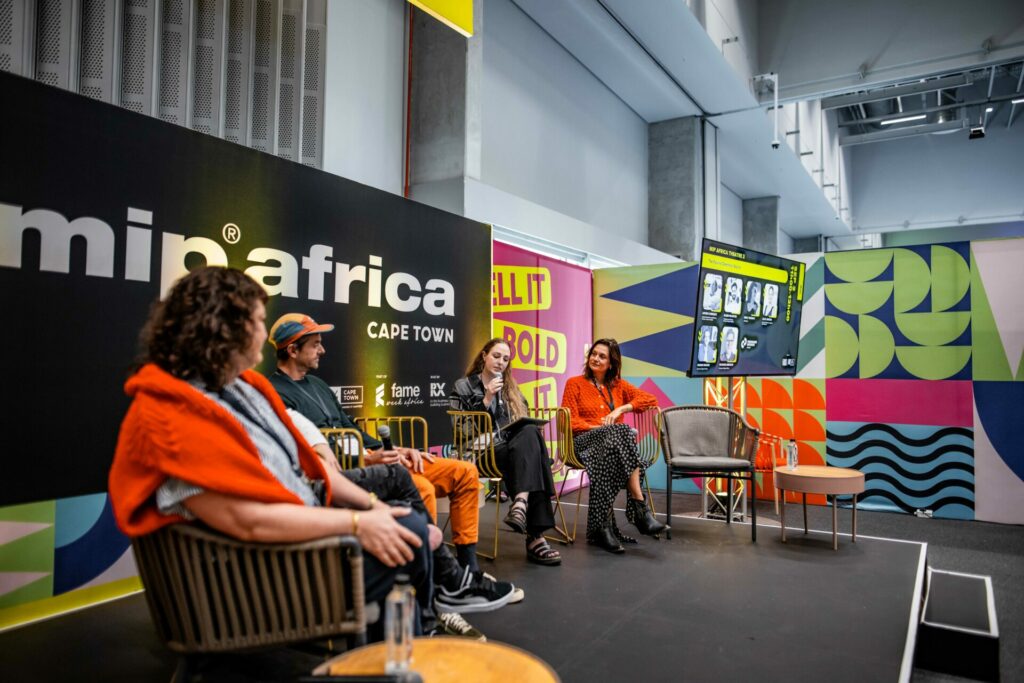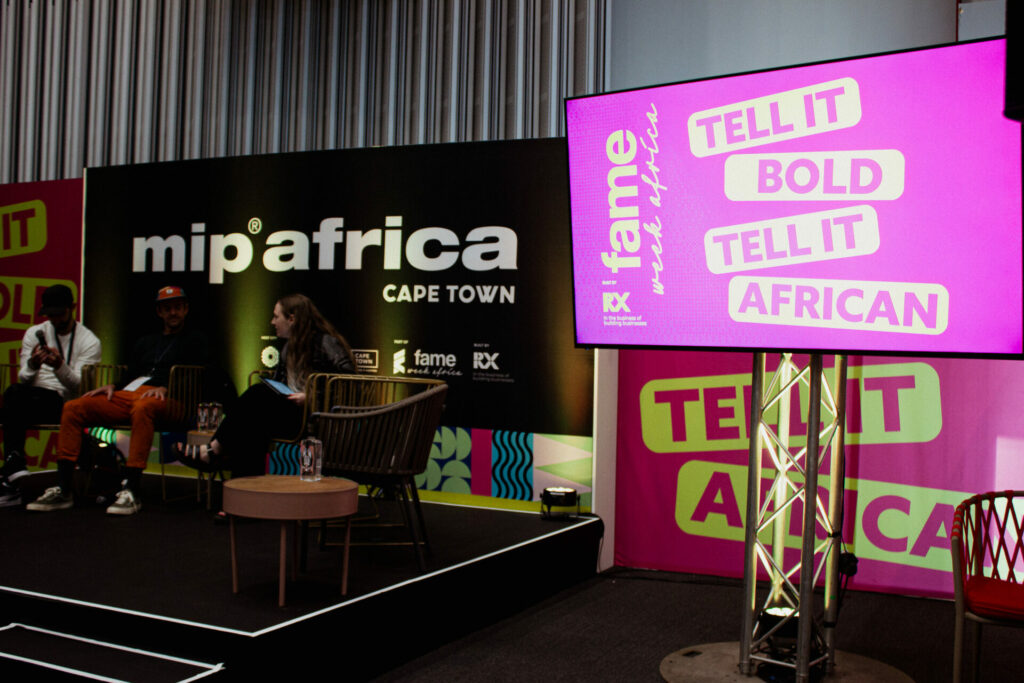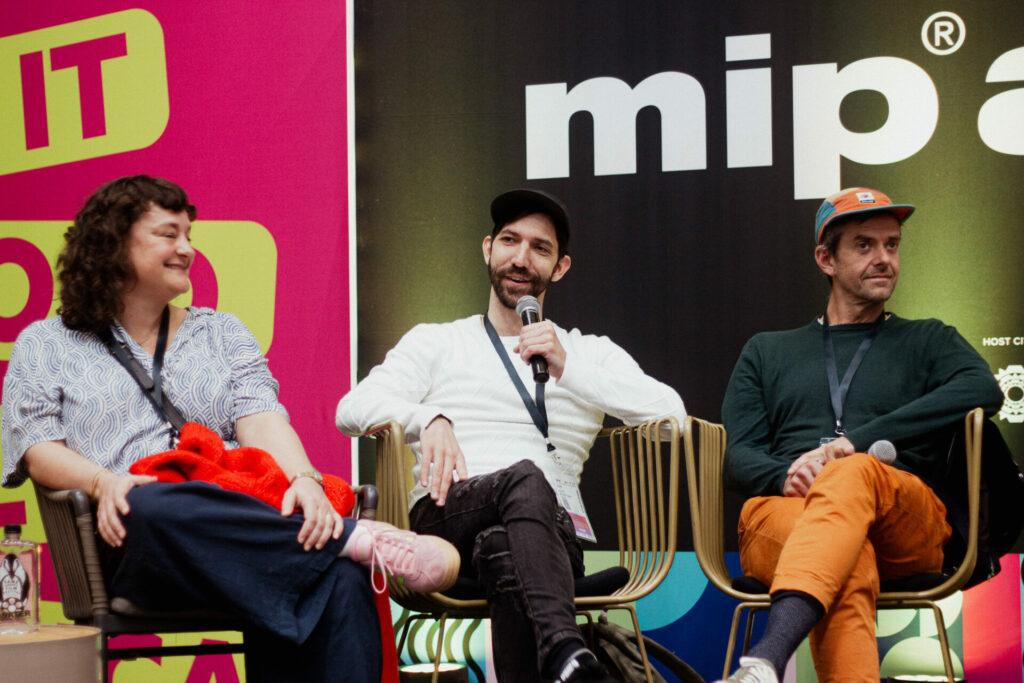FAME Week Africa lived up to its theme this year, bold, unapologetic, and unmistakably African. Tell it Bold. Tell it African. wasn’t just a slogan, it was the spirit of the week.
Our producers were in the thick of it. From cinematic soundscapes to sync exchanges, proving again that African storytelling thrives when it’s fuelled by authenticity, courage, and innovation.
Astrid Iverson led the panel The Future Cinematic Sound, exploring how African soundscapes can transform on-screen storytelling. She was joined by Senior Composer Elben Schutte, Film Editor Emily Bussac, and Julia Jansch, Owner and Director of Southernpoint Pictures, who discussed her film From Dust We Spin. Also on the panel was Robin Goode, Director at Figment Films, who shared insights on Whispering Giants.
Meanwhile, Kaitlyn du Sart took on the Mpasa Sync Exchange, showcasing how our catalogue relieves the pressure, with customisable, ready-to-licence tracks that punch as hard as original music.
Here’s a quick hit of reflection: short, sharp, and straight from the source.
Q&A with Astrid: The Future Cinematic Sound
When you say “bold African sound” – what does that sound like to you?
To me, a bold African sound isn’t the clichés of “tribal drums” or the “Lion King sound” that the world expects. Instead, it’s the incredible diversity of both traditional and contemporary African music. From the rhythms and scales passed down over thousands of years, to the vibrancy of amapiano, gqom, afropop and beyond. It’s a fusion of authentic textures, voices, and instruments woven together with cinematic palettes. Bold means it cuts through the noise, feels unmistakably from Africa, and yet resonates universally.
Whispering Giants and From Dust We Spin are set to push boundaries. How will they shape your take on the African cinematic sound?
While the stories themselves couldn’t be more different, the way we have been approaching them has been really similar; highly collaborative, with the score and edit evolving side by side. Both have pushed us to explore how the African cinematic sound can do more than accompany a narrative, but help shape it. I’ve tried to be as involved as possible with our composers during the process of conceptualising, exploring and experimenting, and this has helped me to truly believe in our objective of creating sound that needs to be deeply rooted here at home and still reach audiences anywhere in the world.
Why do you think African soundscapes matter right now on a global scale?
There is an ever-growing appetite and expectation for authenticity, audiences want it to be fresh and real. Africa holds so much untapped potential: unique instruments, rhythms, textures, and voices, that we as Pressure Cooker are still learning about continuously. These sounds stand out, they surprise, and they add depth to universal stories. Bringing this to global screens isn’t just about representation, it’s about enriching the global cinema with something diverse, collaborative, and unexpected.
After your session, what’s the one thought you couldn’t shake?
Getting to dive deeper with Emily, Robin and Julia was a stark reminder of just how fortunate we are to have been given the space and time to truly craft something special for these stories. And having their trust to do this is such an incredible privilege.



Q&A with Kaitlyn: Mpasa Sync Exchange
Selecting the right music for your project can often be a headache. How does our catalogue flip that script?
The Pressure Music Catalogue isn’t just a pile of tracks sitting in a library, it’s music that was born out of real creative briefs and storytelling needs. Every track has been crafted by composers who think like filmmakers, so it’s designed to work to picture. That means editors don’t waste hours hunting, directors aren’t stuck with generic stock filler, and producers don’t need to blow the budget on original composition just to get something that feels authentic. Plus, all our tracks are fully customisable with stems and/or sessions available, so you can bend them, reshape them, and make them fit seamlessly into your project without the usual stress.
What makes these easy-to-licence, customisable tracks the “next best thing” to original music?
Because they give you the best of both worlds. You get the ease and affordability of catalogue rates, but with the flexibility to tailor a track so it becomes one-of-a-kind for your story. Need to swap instruments, add vocals, or adjust the tempo? Our team can do that quickly as we have the original music session. The end result is music that feels like it was scored for your project, without the timelines and costs of a full original score. That’s why we see it as the “next best thing”, it gives your project its own sonic identity, but in a way that’s fast, flexible, and accessible.
Where do you see African music styles making the biggest impact in global sync?
I think we’re at such an exciting moment for African music in global sync. What we’re seeing is that African styles aren’t just being pulled in for ‘flavour’ anymore, they’re shaping the sound of projects from the ground up.
Amapiano is probably the clearest example right now, with its textures and grooves finding a home in advertising and lifestyle campaigns worldwide. Afrobeat and Afro-fusion are cutting through strongly in global TV and film placements, especially when a story needs energy and cultural authenticity.
But beyond the obvious chart-driven sounds, I believe the biggest impact still lies ahead in spaces like film, streaming series, and gaming, where soundtracks can really carry narrative identity. The elements that make up African music give storytellers something you can’t replicate anywhere else: a sense of rootedness and originality.
At Pressure Cooker Studios, we’ve found that when brands and directors lean into African styles, it’s not just about trend-hopping, it’s about unlocking a sound that feels authentic, fresh, and globally resonant at the same time.
That’s why I see African music continuing to move from the periphery into being a core part of how stories are told through sync.
What moment from the one-on-ones stuck with you most?
At the start, the idea of pitching something that could speak for itself felt really daunting. How do you “sell” something so powerful and impactful? But when I stepped back, I realised that at the end of the day, we’re all in the same industry, speaking the same language, facing similar struggles and all looking for solutions.
What stuck with me most was the moment I realised I did have answers, and when I shared them, people responded with the same passion and excitement that I felt. That exchange really hit me, how important it is to stay grounded and authentic. Because when you show up authentically, you’re met with that same energy in return.
The highlight for me was seeing someone’s eyes light up when I was able to offer a solution that resonated. That passion and connection is what really stayed with me.